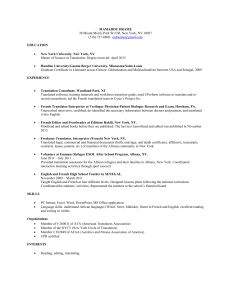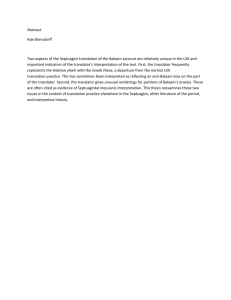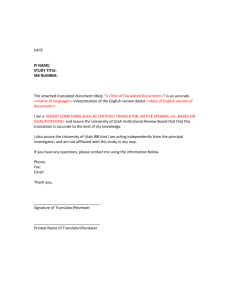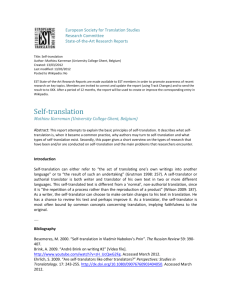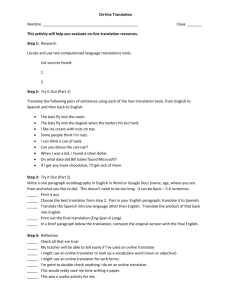our International Fiction Reading Group Guide
advertisement
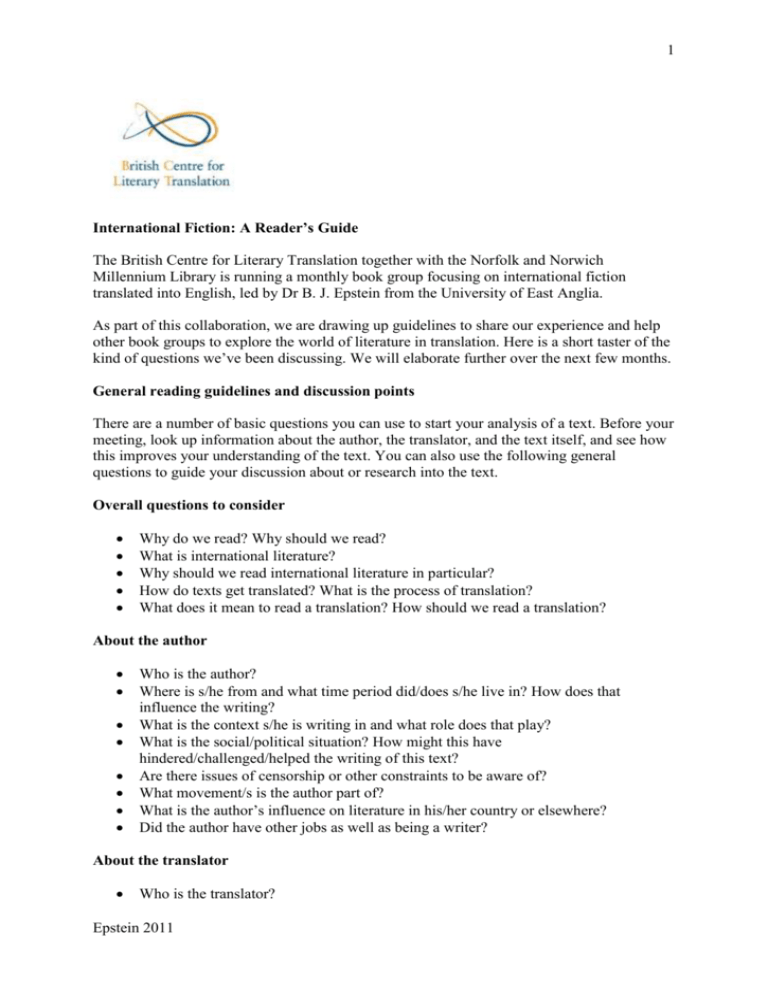
1 International Fiction: A Reader’s Guide The British Centre for Literary Translation together with the Norfolk and Norwich Millennium Library is running a monthly book group focusing on international fiction translated into English, led by Dr B. J. Epstein from the University of East Anglia. As part of this collaboration, we are drawing up guidelines to share our experience and help other book groups to explore the world of literature in translation. Here is a short taster of the kind of questions we’ve been discussing. We will elaborate further over the next few months. General reading guidelines and discussion points There are a number of basic questions you can use to start your analysis of a text. Before your meeting, look up information about the author, the translator, and the text itself, and see how this improves your understanding of the text. You can also use the following general questions to guide your discussion about or research into the text. Overall questions to consider Why do we read? Why should we read? What is international literature? Why should we read international literature in particular? How do texts get translated? What is the process of translation? What does it mean to read a translation? How should we read a translation? About the author Who is the author? Where is s/he from and what time period did/does s/he live in? How does that influence the writing? What is the context s/he is writing in and what role does that play? What is the social/political situation? How might this have hindered/challenged/helped the writing of this text? Are there issues of censorship or other constraints to be aware of? What movement/s is the author part of? What is the author’s influence on literature in his/her country or elsewhere? Did the author have other jobs as well as being a writer? About the translator Who is the translator? Epstein 2011 2 Where is s/he from? Does that influence the translation? What is his/her background? What education does s/he have? What languages does s/he work with? What other texts/authors has s/he translated? What is the context s/he is translating in and what role does that play? Is the translator also a writer? How do those two roles influence one another? Has the translator written about the art of translation? What are his/her views on it? How has his/her translation work been reviewed/judged/critiqued? About the text What is it about? Who are the characters? What are the main themes? Does it have a message/moral/point? Is the text worth reading and why or why not? What makes the text international? What are its particular stylistic features? Do the features seem to have been created in translation or are they from the original text? What movements/genres does it belong to? How is it similar to or different from texts in a similar genre/style that were written in the target language versus being translated to the target language? Can you detect the translator’s voice in the text? Are you aware that you are reading a translation? Why do you think you notice the “translationness” of the text? How do you think this translator has managed to maintain the author’s voice, style, rhythm, positioning of the words, relationship of words to each other, and all the other factors that make up a creative work? Is this a “good” translation? What would that mean and how could you tell? What makes this text international and in what ways does its “internationalness” matter? Also consider whether and how the text enhances (or, alternatively, diminishes) your understanding of the author’s or book’s cultural background. Do you know if the text is read in any school/university classes? What subjects/fields could the text conceivably be studied in? About reviews of the text in translation Who is reviewing the work? Is it someone who works as a translator? Is it a writer who works in a similar genre/movement? Is the fact that the text is a translation mentioned? Does the reviewer know the source language and has s/he compared the original text with the translated text? Is the name of the translator given? What else is said about the translator, if anything? What words does the reviewer use in referring to the translation? How do the words chosen seem to reflect the reviewer’s views of translated literature in general? Which journals/newspapers have published reviews of this text? Would similar texts written in the target language be reviewed in the same publications? www.bclt.org.uk Epstein 2011

